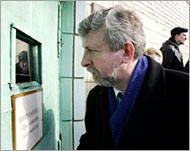US, EU to ‘punish’ Lukashenko
The US and European Union are to impose sanctions and travel restrictions on Belarusian President Alexander Lukashenko and other officials after an election widely seen as rigged.

In Washington, Scott McClellan, the White House spokesman on Friday said the US planned to impose financial sanctions and travel restrictions against Belarus officials to show its opposition to the government’s crackdown on protesters.
McClellan said: “We strongly condemn the actions by Belarussian security services.”
Speaking on behalf of the EU in Brussels, Austrian Foreign Minister Ursula Plassnik on Friday said the 25 EU leaders had decided to take steps against individuals “politically and administratively” responsible for electoral violations – including President Lukashenko.
Plassnik said EU leaders would invoke “restrictive measures”, which will reportedly take effect in April, to express their opposition to the violation of “international electoral standards.”
The decision puts Lukashenko on the same EU blacklist as Zimbabwe’s President Robert Mugabe and Myanmar’s military leaders, all of whom have a freeze on their European assets and visa bans against them.
On Monday, the Organisation for Security and Cooperation in Europe’s (OSCE) observer mission to Belarus announced that the elections did not meet democratic standards.
“Arbitrary use of state power and widespread detentions showed a disregard for the basic rights of freedom of assembly, association and expression,” the OSCE mission said.
Russia demurs
Russia, which has backed Lukashenko as a regional ally in the former Soviet bloc, hit back on Friday, accusing the OSCE mission of instigating tensions during the election campaign, and of demonstrating bias.
 |
|
Opposition leader Milinkevich |
|
|
“Long before the elections, the OSCE mission led by the Office for Democratic Institutions and Human Rights (ODIHR) had declared that (the elections) would be illegitimate and it was pretty biased in its commentaries on their progress and results – let’s be frank – thus playing an instigating role,” Russian Foreign Minister Sergey Lavrov said, adding that there was no cause to doubt the official results of the election.
Russia and Belarus had signed a union agreement in 1996, which calls for close political, economic and military ties, and eventually a full merger.
Lavrov’s accusation prompted denials from ODIHR director Christian Strohal, who asserted that the observation mission’s mandate does not allow it to influence elections. Rather, he said, it provides an “impartial, balanced” picture of the electoral process as a whole.
“To accuse the mission of ‘instigating tension’ or ‘playing an inflammatory role’ shows a deliberate disregard for these facts,” added Strohal.
Major factors
|
“The OSCE … was pretty biased in its commentaries … thus playing an instigating role” Sergey Lavrov, |
The OSCE’s negative assessments of recent elections in Georgia, Ukraine and Kyrgyzstan were major factors in galvanising protests that helped bring opposition leaders to power.
Lukashenko has repeatedly charged that similar demonstrations were being prepared in Belarus with foreign backing.
Plassnik also called on authorities in Belarus to “refrain from any further action” against protesters after police in Minsk stormed the opposition tent camp early on Friday morning, detaining hundreds of demonstrators who had spent a fourth night in a central square to protest Lukashenko’s victory.
The EU leaders demanded the immediate release of all those detained, and hailed Belarusian democratic groups’ “continuing and brave efforts to advance the cause of democracy”, describing Belarus as a “sad exception” in a continent of democratic societies.
They also promised to enhance access to “independent sources of information.” A $2.4 million EU-funded independent TV and radio broadcast programme was launched in February to try to rally opposition to Lukashenko.
No economic sanctions were expected against Lukashenko’s government, officials said, because the EU wants to target individual leaders rather than the country’s economy.
Belarus is the main land transit route for Russian oil and gas to Western Europe.